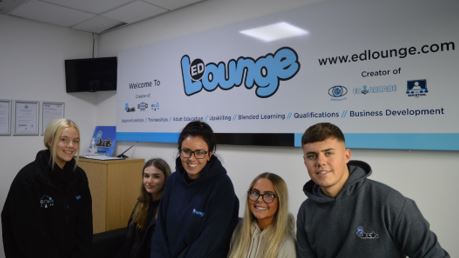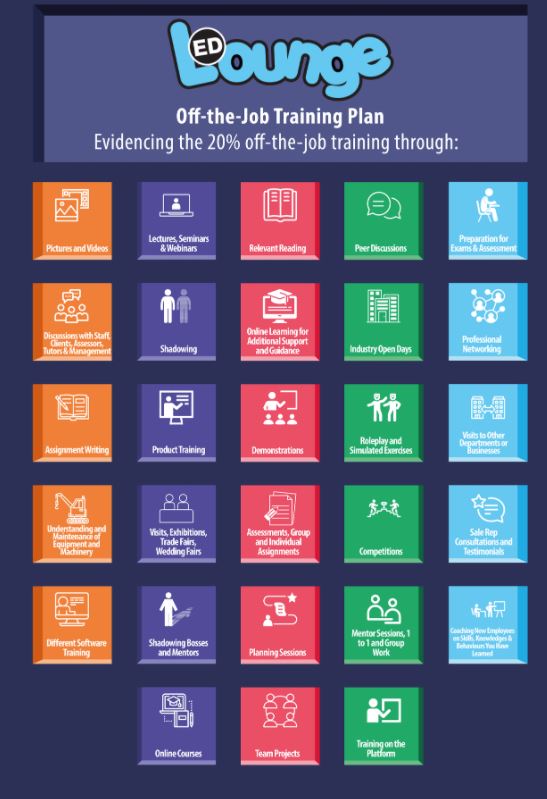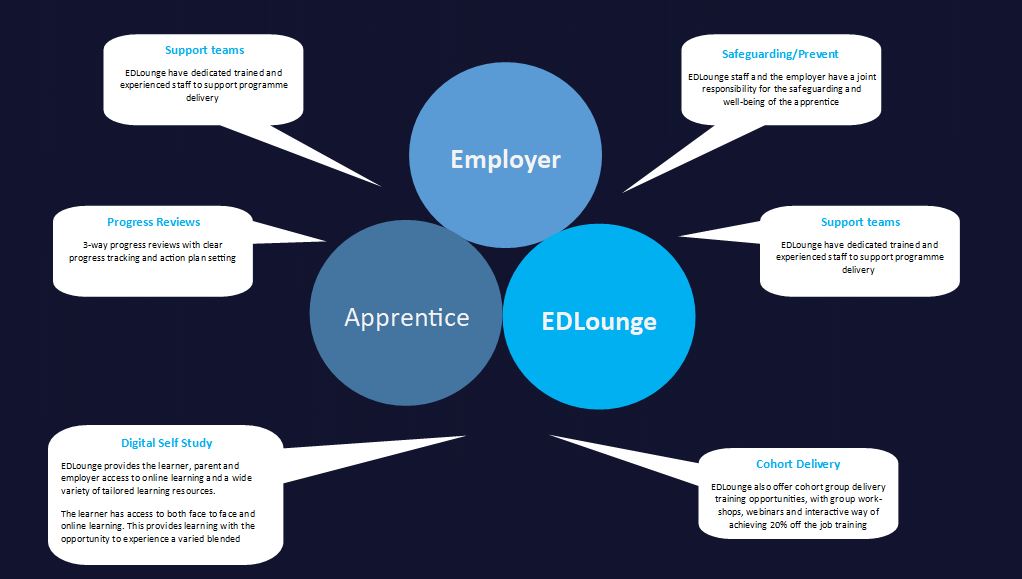 is the...
is the...
part of EDLounge Group.
 is the...
is the...
part of EDLounge Group.
Employers
An apprenticeship is a job with training. An apprentice will:
- Work alongside experienced employed staff
- Gain ‘on the job’ specific practical skills
- Learn while you earn a wage and get holiday pay
- Be given ‘off the job’ time for competency-based study related to their role (the equivalent of one day a week)
- gain the technical knowledge, practical experience and wider skills and behaviours that they need for their immediate job and future career.

The apprentice gains this through formal off-the-job training and the opportunity to practise these new skills in a real work environment (on-the-job training).

The job must have a productive purpose and you must provide the apprentice with the appropriate support and supervision to carry out their job role and their apprenticeship. This includes the opportunity to embed and consolidate the knowledge, skills and behaviours gained through apprenticeship off-the-job training in the workplace.
An apprenticeship includes a practical period of work and training that lasts for a minimum duration of 12 months. This includes where the content, duration and price have been adjusted to recognise prior learning. For example, to satisfy this requirement, an apprentice who starts their training on 1 August 2020 must still be receiving training on 31 July 2021. The apprentice must be involved in active learning throughout an apprenticeship.
The standard specification or assessment plan may require this practical period of training to be longer to support the delivery of the full apprenticeship content. The end-point assessment can only be taken after the minimum duration has been met. You must confirm this as part of the gateway checks.
The minimum duration of each apprenticeship is based on the apprentice working at least 30 hours a week, including any off-the-job training they undertake. Please note: Working fewer than 30 hours a week, or being on a zero-hours contract must not be a barrier to successfully completing an apprenticeship.
How EDLounge can help you map your business to apprentices and UPKSILL your CURRENT staff
EDLounge offers a free Apprenticeship consultancy for any employers wanting to take on an Apprentice to grow their business,
EDLounge will come to your premises at the time of your convenience and discuss your Apprenticeship requirements, supporting all stakeholders to build a bespoke learning experience for your Apprentices, this consultancy process allows us to plan in advance the learner journey to minimise the impact on the day to day running of your business.
EDLounge is a Digital educational provider, this Model will enable Apprentices to learn at any time, anywhere giving flexibility to how the apprentices can learn throughout their learner journey.
If you want us to pop out for a brew or a cuppa for a chat about apprentices and upskilling your workforce, then I will pick up a bacon or vegan sandwich for us on the way (with a tea cake if that is your preference!). Book an appointment today, we will also provide the tea or coffee.

Your apprenticeship programme
This will be delivered by us your Apprenticeship Provider a designated training provider. This outline helps highlight everyone’s involvement in the apprenticeship process:
- EDLounge - will oversee all aspects of your apprenticeship provision to ensure its quality, progress and achievement. We will deliver off the job training to develop job-related knowledge and enhance your skills.
- The employer - will employ an apprentice and provide on the job learning opportunities to enable you to become competent in your role. Your employer will support you throughout your apprenticeship and be there for you at every stage to help you learn the skills, develop the knowledge and build the appropriate employee behaviours that employers seek.
At EDLounge we work hard to support the individual learning needs of each apprentice as well as the business needs of all our employers. We value the good communication links between employers, employees and EDLounge staff, which form a crucial part of supporting the apprentice and employer and together we will help every apprentice to succeed and achieve their ambitions.
Getting started with apprentices
You have access to a free tool to help you recruit new apprentices into your business please refer to the following links for more information:
You and EDLounge (your training provider) must conduct an initial assessment screening to include Maths and English Initial and diagnostic assessments, in line with the proposed apprenticeship agreement.
Your initial assessment must show that:
- The individual requires significant new knowledge, skills and behaviours to be occupationally competent in the job role
- The required training meets the funding rules relating to the minimum duration of the practical period
- You are satisfied that the apprenticeship is the most appropriate training programme for the individual; the training programme aligns with an approved apprenticeship standard, at the most appropriate level, and recognition of prior learning has taken place
The approved apprenticeship agreement must set out:
- The apprentice’s details (name, occupation, place of work)
- The apprenticeship standard and level being followed
- The start and end date of the apprenticeship (this includes end-point assessment EPA)
- The start and end date of the practical period (this excludes EPA)
- The duration of the practical period
- The amount of time the apprentice will spend in off-the-job training
The practical period start date set out in the apprenticeship agreement must match the practical period start date in the commitment statement and the start date in the Individual Learner Record (ILR).
Please note: If the apprenticeship agreement is incomplete and/or does not meet the statutory requirements the individual will not have a valid agreement and will not be eligible to receive funding. The signed apprenticeship agreement must be distributed to both signatories (you and the apprentice) and you must keep a copy of this in the evidence pack, along with any revisions.

Apprentice wages
Every apprentice must be paid a lawful wage for the time they are at work and in off-the-job training.
You must meet the cost of the apprentice’s wages. Where you are using the apprenticeship minimum wage you must only do so from the start of the apprenticeship programme and not before.
You can find further information on apprentice wages here: National Minimum Wage and National Living Wage rates - GOV.UK
Off-the-Job Training
Off-the-job training is a statutory requirement for an apprenticeship. It is training that is received by the apprentice, during the apprentice’s normal working hours, for the purpose of achieving the knowledge, skills and behaviours of the approved apprenticeship referenced in the apprenticeship agreement. By normal working hours, we mean the hours for which the apprentice would normally be paid, excluding overtime.
Please note: It is not on-the-job training which is training received by the apprentice for the sole purpose of enabling the apprentice to perform the work for which they have been employed. By this we mean training that does not specifically link to the knowledge, skills and behaviours of the apprenticeship.
Off-the-job training must deliver new skills that are directly relevant to the apprenticeship. It can include the following:
- The teaching of theory (for example, lectures, role-playing, simulation exercises, online learning, and manufacturer training);
- Practical training, shadowing, mentoring, industry visits, and participation in competitions; or learning support and time spent writing assessments/assignments
Off-the-job training does not include:
- Training to acquire knowledge, skills and behaviours that are not required in the apprenticeship standard;
- Progress reviews or on-programme assessment required for an apprenticeship standard; or
- Training takes place outside the apprentice’s normal working hours.
It is up to you to decide how the off-the-job training is delivered. It can include training that is delivered at the apprentice’s normal place of work. It can also include regular day release, block release and special training days/workshops. The number of planned off-the-job training hours, for the full apprenticeship, must be documented on the apprenticeship agreement and the commitment statement. These must be separate documents.
Since 1 August 2019 planned off-the-job training hours must also be documented on the individualised learner record. You or the provider must not change this figure once submitted.
From 1 August 2020, actual off-the-job training hours should be documented on the ILR at the end of the practical period.
Evidence must be available to support the delivery of the planned off-the-job training that is set out in the apprentice’s commitment statement.
If planned off-the-job training is unable to take place as scheduled, you must ensure this is re-arranged so that the full complement of the training set out in the commitment statement can still be delivered. All off-the-job training must take place during normal working hours.

What is the Apprenticeship Gateway?
In the world of apprenticeship standards, the gateway is the door between the two core stages of the apprenticeship. At the gateway, the employer (often in consultation with the apprenticeship provider) unlocks the door because they believe the apprentice is competent in their job and ready and able to prove it.
The Gateway ensures that all apprentices have completed the mandatory aspects of the occupational standard and any work that underpins specified assessment methods and that employers believe an apprentice is occupationally competent at the point they enter the gateway.
Employers have an important role in assessing competency and they have a key responsibility at the gateway in signing off the apprentice as ready to undertake the End Point Assessment known EPA. it is not seen however as appropriate for employers to be directly involved in EPA assessment methods because their independence is compromised.

What is meant by End Point Assessment (EPA)?
The EPA takes place with an independent End Point Assessment Organisation (EAPO) when all the on-programme training has been completed and after the gateway has been passed. It should only start once the employer is confident that the apprentice is occupationally competent, that is, they are deemed to be working at or above the level set out in the occupational standard and ready to undertake an EPA. The employer may seek input from the apprentice’s training provider(s) in making this decision, but the decision must ultimately rest with the employer.
The EPA plan must set out any gateway requirements to be completed or achieved before an apprentice can undertake an EPA. This section of your EPA plan must cover:
- minimum English and mathematics requirements
- mandatory qualifications detailed in the occupational standard
- any requirements or outputs that underpin an assessment method – for example, if a portfolio demonstrating particular aspects of the occupational standard is used to support a presentation in the EPA, you must make it clear that this portfolio should be completed prior to the gateway and what it should contain.
Commitment to Delivering and Supporting the Apprenticeship
Before the apprenticeship practical period starts and before the apprenticeship agreement is signed, you as the employer and the apprentice must have contributed to and signed a copy of the commitment statement (often known as the individual learning plan). This must set out how all parties (you as the employer and as the main provider) and the apprentice will support the achievement of the apprenticeship.
The commitment statement and apprenticeship agreement must be separate documents.
The commitment statement must be kept up to date with any material changes (e.g. as a result of changes agreed upon at a progress review).
All parties must keep a current signed and dated version of the commitment statement. You must keep your version (and previous versions) in the evidence pack with the apprenticeship agreement.

EDLounge looks forward to working with you and the apprentice to successfully achieve all our combined objectives.
Sources of Further information: Find an Apprenticeship - GOV.UK Employing an Apprentice - GOV.UK

Responsibilities as a Mentor of Apprentices - The EDLounge mentor programme
At EDLounge we work and fully train your staff to be mentors for your business.
We do this because we believe that the employer and mentor are paramount for apprenticeship and their success.
We have also created this comprehensive mentor programme to have minimal impact on the day to day running of your organisation. We train the mentor alongside planning out the skills and behaviours needed for each sector of the apprentice's journey.
This programme can be done digitally or face to face depending upon the mentor's requirements.
What impact does a Mentor make when developing an Apprentice?
The mentor who wishes to take an interest in supporting an apprentice plays a pivotal role in the apprentice’s learner journey. This is your chance to develop and mould an Apprentice into your high standard of working practices.
Undertaking an apprenticeship is a significant commitment to skills development both on the part of the apprentice and their employer.
Most employers recognise that apprentices make a significant contribution to the workplace whilst forming an important aspect of succession planning. For the apprentices themselves, having a mentor within the organisation who is appointed to support their training progression – the workplace mentor – is invaluable.
Why Does an Apprentice need a Mentor?
Apprentices face a demanding schedule of skills, knowledge and behaviours development which can include learning on and off the job, online seminars, classroom learning, regular progress reviews and more besides. Appointed mentors help apprentices with other aspects of their development, keeping them on an even keel. Mentors are there to specifically pass on their skills and guide their Apprentices in navigating the world of work. Throughout the Apprenticeship, Apprentices benefit from the life /work skills of more experienced professionals, who they can form a working bond with and turn for advice and guidance.
Taking on the role of a mentor does not involve being a line manager, getting involved in disciplinary issues or teaching any theory. What it does involve is mentoring (showing the apprentice) them and passing on their skills, knowledge and professional behaviours and experience the mentor has built up over years.
What Support do I receive to be able to take on a mentoring role?
EDLounge takes the role of mentors very seriously. They are an integral part of apprentices getting a hold on the career ladder. To help this go as smoothly as possible EDLounge provides mentor training prior to the start of the Apprenticeship. This will help the Mentor support the apprentices navigate their way through the Apprenticeship and pass their End Point Assessment
The role of the mentor is critical but it should never be a burden. Mentors are handpicked by their employers because of their own skills and professionalism. The main aspect of mentoring is passing these qualities on to the next generation of employees.
What impact can I make on an Apprentice?
Deciding to step up to the challenge of being a workplace mentor involves supporting the Apprentice throughout the Apprenticeship. Giving the apprentices the workplace ability to progress and achieve their career aims.
The Mentor will play a vital role in the tri-party Apprentice review with the apprentice and EDLounge tutor assessor. the mentor will support, motivate and improve the skills of the Apprentice leading to the next generation of managers. Anything passed on will be bolstered by the structured educational aspect of the apprentice’s training. On a day to day basis, mentors are taking part in helping to develop fully rounded employees.
The result for mentors is the proud feeling of being involved in somebody else’s success. Mentors tell us that is it a very satisfying aspect of the job. Furthermore, being a successful mentor can help develop the sorts of skills required for people development and team-leading. This means it can help the mentor progress in their own career
Contact us now to work with us.
